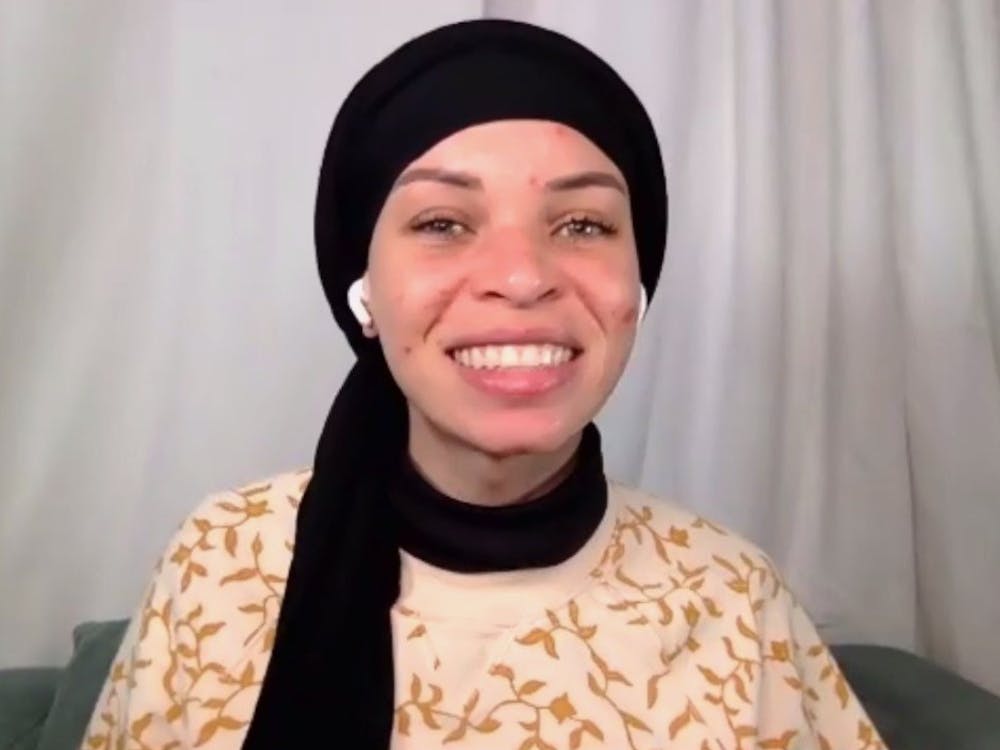Muslim educator and activist Blair Imani discussed the concepts of intersectionality and social and personal identity with students on a Monday night virtual talk.
Imani began by delving into what ego and intersectionality meant to her as a Muslim.
“Our ego often places our personal identities and projects it onto others and makes our experiences be rubrics for how we understand others … whether we're looking at the black community, the Muslim community, the LGBTQ+ community, women, the communities that I'm a part of, Americans, there are so often the conceptualizations that we have of ourselves and we apply it to others,'' Imani said.
She said that often people create a monolith when describing a social group. She provided the example of how the LGBTQ+ community is often seen only as “white, cisgender gay folks who are wealthy and who do interior design.”
Imani has had her own experiences dealing with being a bisexual Muslim. She converted to Islam in 2015 and said that she found herself preoccupied with how she was performing the religion rather than what Islam meant to her.
In a similar way, Imani found that others did not see her as bisexual due to being in a relationship that is “seemingly heteronormative.” Imani encouraged students to make room for a multitude of different expressions and uplift people who are marginalized, rather than pushing people toward specific expectations.
“So often, we are living up to the expectations created by people that we did not consent to, that we did not approve of, that we did not review prior to being standardized to them, and yet made to be accountable to them,” Imani she.
Seniors Sarah Chaoui and Doha Ali moderated the question-and-answer portion of the talk.
When asked how Imani reconciled her ego with her pride in her own identity, Imani responded with a personal experience that happened in the past week.
Imani had posted an image in which she held a picket sign with the text, “If you are only listening to lighter-skinned Black women about race, you're racist." Following a discussion with a mentor, Imani said she realized there was a disconnect in having her, a light-skinned Black woman, holding up a sign saying not to listen exclusively to light-skinned people. Following a discussion with a mentor, she took down the post and posted an apology.
“I can have pride in my identity as a black woman and as an educator, but I can also have enough humility to say that was inappropriate,” she said.
Imani then answered questions related to her perception of “callout culture.”
“Being called out really depends on how you receive it, because not every critique is going to be super politely packaged up and given to you, and it might take you a minute to get it right,” Imani said.
Ending the talk, Imani discussed how to show kindness while healing from personal trauma.
“Recognize the ways that we've internalized dehumanization towards people, whether they're in our own community or their different marginalized community, and extend them that grace that you would want for yourself,” Imani said.
The talk was co-sponsored by the Baldwin Scholars Program, Muglia Family Foundation, Penny Pilgram George Leadership Initiative, Center for Sexual and Gender Diversity and Center for Muslim Life. It was part of the Jean Fox O’Barr Distinguished Speaker Series and an Islamic Awareness Week event.
Correction: This article was updated to correct the text of a social media post that Imani removed and to reflect that it was a conversation with a mentor that caused her to remove it, not audience reception. The Chronicle regrets the errors.
Editor's note: This story was updated to reflect that Imani removed that social media post and posted an apology.
Get The Chronicle straight to your inbox
Signup for our weekly newsletter. Cancel at any time.

Ayra Charania is a Trinity junior and a senior editor of The Chronicle's 118th volume.

